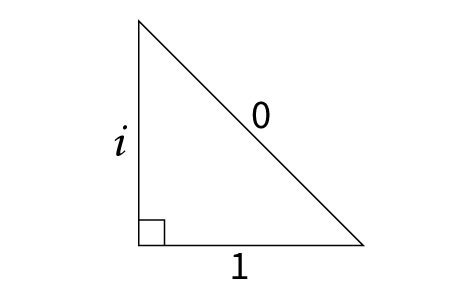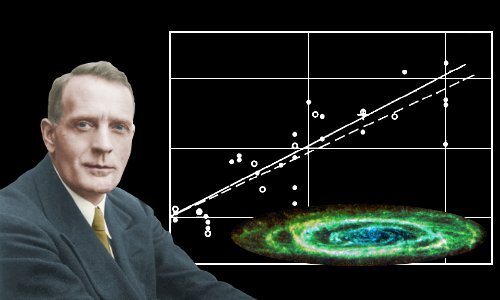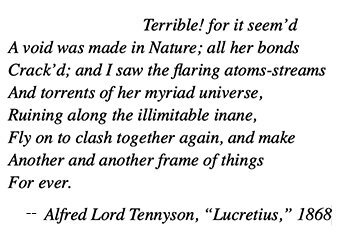[Another viewpoint: “One of the biggest joys was learning that computers are like mathematics: You get to make up your own world with its own rules.” — Linus Torvalds, creator of Linux]
“What are the purely aesthetic qualities of mathematics? A very high degree of unexpecteedness. combined with inevitability and economy.”
“The seriousness of a mathematical theorem lies in the significance of the mathematical ideas which it connects. We may say, roughly, that a mathematical idea is significant if it can be connected, in a natural and illuminating way, with a large complex of other mathematical ideas.”
“A chess problem is genuine mathematics, but it is in some way trivial mathematics. Chess problems are unimportant. The best mathematics are serious as well as beautiful. Chess problems are the hymn-tunes of mathematics.”
“I do not know of a major mathematical advance initiated by a man past 50… Mathematics is not a contemplative but a creative subject. No one can draw much consolation from it when he has lost the power of the desire to create; and that is apt to happen to a mathematician rather soon.”
[Comment 1: “After I stopped dancing, I was unable to listen to beautiful music.” -- Suzanne Farrell, American ballerina who was forced to retire after hip surgery]
[Comment 2: Orion@NAU.edu observes that most major problems in astronomy today are undertaken and resolved, not by individuals, but through the collaborative efforts of many scientists, and so the “age of 50” notion, while perhaps valid in Hardy’s time, no longer applies. However, I don’t know whether this new model of collaborative problem-solving applies to mathematics as well.]
— G.H. Hardy, A Mathematician’s Apology
“Mathematics is the language in which God has written the universe.”
— Galileo Galilei (1564-1642)
[Or, less theologically: “Mathematics is the syntax of reality.”]
“As far as the laws of mathematics refer to reality, they are not certain; and as far as they are certain, they do not refer to reality.”
— Albert Einstein, Addresss to Prussian Academy of Sciences (1921)
[Does Einstein’s belief imply that God’s mathematics and human mathematics are not identical? Or that God’s laws are not mathematical at all?]
Updated Pythagorean Theorem for Math Nerds
“Nature to be commanded must be obeyed.”
— Francis Bacon, Novum Oganum, 1620
(“To use the powers of Nature we must understand how to apply Her governing laws.”)
“Western faith in the beauties of doubt and refutation is one of our central intellectual virtues.”
— Vicki Hearne, Adam's Task
[Karl Popper argued that systematic doubt and testing are essential to scientific enterprise: “In so far as a scientific statement speaks about reality, it must be falsifiable; and in so far as it is not falsifiable, it does not speak about reality.” — Karl Popper, The Logic of Scientific Discovery, 1959]
“The order of the mean density of matter in space can be roughly estimated at about one grain of sand per volume of space equal to the size of the earth.”
— Edwin Hubble, The Realm of the Nebulae
[Related thought: “If we could magnify the simplest hydrogen atom so that its nucleus (a proton) were the size of a basketball, then its lone electron would be found about 2 miles away.” — https://education.jlab.org]
“There is no nature at an instant.”
— Alfred NorthWhitehead, Modes of Thought, 1938
[The poetic version: “Nothing can surpass the mystery of stillness.” — E.E. Cummings, 73 poems, 1963]
“If an atom of hydrogen possesses the qualities of hydrogen, not merely because it consists of a certain number of electrons, nor even because those atoms are arranged in a certain way, but because they move in a certain rhythmical way, it follows that within a given instant of time the atom does not possess those qualities at all; it only possesses them in a tract of time long enough for the rhythm of the movement to establish itself.”
— R.G. Collingwood, The Idea of Nature
[On the rhythm of mirrors and light:
"The oscillating electrical field in the incoming light wave produces a force on the charges inside the mirror. The comparatively loosely held bonding electrons, along with the free electrons present in metals, can move in response to these electrical forces, however. These electrons oscillate at the same frequency as the incident light, which gives rise to the reflected wave.
"Because there are a great many electrons in the mirror, all vibrating at the frequency of the incident light, reflection from the mirror is really a group effort. All the electrons dance to the same music, whose rhythm is provided by the incident light wave. This coordination causes the reflected wave to make the same angle with respect to the mirror's surface as does the incident beam. — Peter N. Saeta, in Scientific American, October 21, 1999]
“I believe there are no questions that science can't answer about a physical universe.”
— Stephen Hawking, NPR interview, 2013
“Conscious subjects and their mental lives are inescapable components of reality not describable by the physical sciences.”
— Thomas Nagel, Mind and Cosmos, 2012
“From all we have learnt about the structure of living matter, we must be prepared to find it working in a manner that cannot be reduced to the ordinary laws of physics. And that not on the ground that there is any ‘new force’ or what not, directing the behavior of the single atoms within a living organism, but because the construction is different from anything we have yet tested in the physical laboratory.
“Matter and energy seem granular in structure, and so does ‘life’, but not so mind.”
— Erwin Schrödinger, What is Life?” 1943
[“There is nothing so inconceivable as that matter should be conscious of itself.” – Pascal, Pensées, 1670]
“Sooner or later we shall die, and it is highly probable that the whole universe around us will die the heat death, in which the world shall be reduced to one vast temperature equilibrium in which nothing really happens. There will be nothing left but a drab uniformity out of which we can expect only minor and insignificant local fluctuations...
“As entropy increases, and all closed systems in the universe, tend naturally to deteriorate and lose their distinctiveness, to move from the least to the most probable state, from a state of organization and differentiation in which distinctions of form exist, to a state of chaos and sameness. In this universe, order is least probable, chaos most probable. But while the universe as a whole, if indeed there is a whole universe, tends to run down, there are local enclaves whose direction seems opposed to that of the universe at large and in which there is a limited and temporary tendency for organization to increase. Life finds its home in some of these enclaves.”
— Norbert Wiener, The Human Use of Human Beings






























